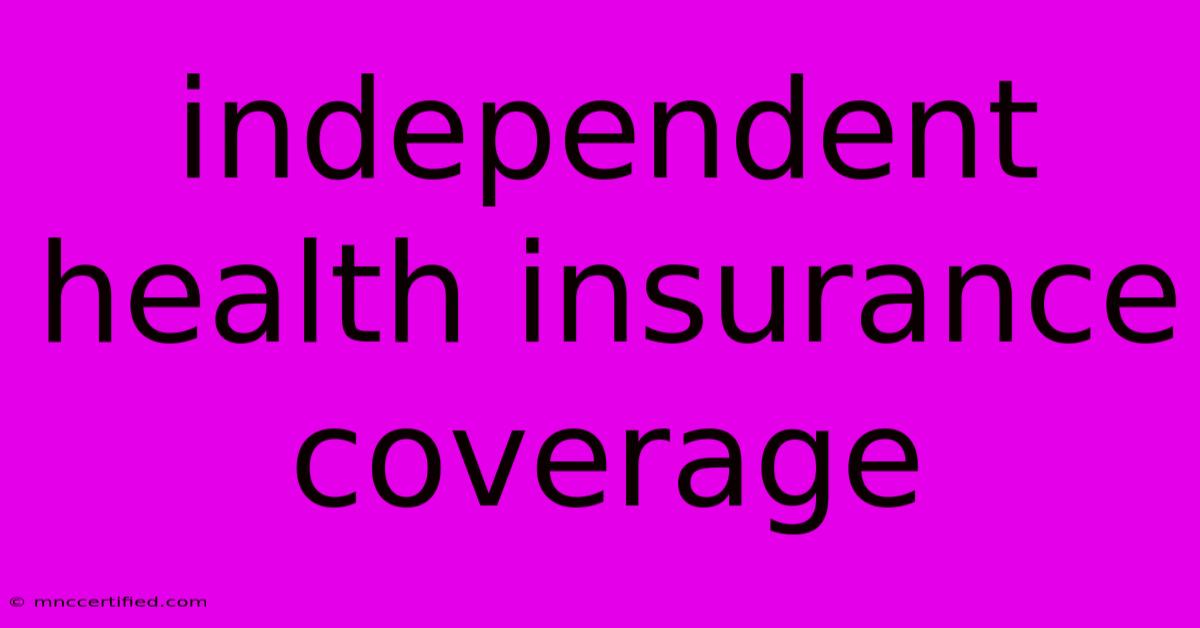Independent Health Insurance Coverage

Table of Contents
Navigating the World of Independent Health Insurance Coverage
Choosing health insurance can be overwhelming, especially when considering independent coverage. But don't worry, this guide will equip you with the knowledge to confidently navigate the landscape of independent health insurance.
What is Independent Health Insurance?
Independent health insurance, also known as individual health insurance, is a policy purchased directly from an insurance company without going through an employer or a government program like Medicare or Medicaid. It's a popular option for self-employed individuals, freelancers, and those who work for small businesses that don't offer group plans.
Advantages of Independent Health Insurance
Flexibility and Customization: Independent plans offer greater flexibility, allowing you to choose coverage levels and features that best suit your individual needs and budget. This empowers you to customize your plan with specific features like dental, vision, or prescription drug coverage.
Control Over Your Premiums: Independent plans give you more control over your monthly premiums. You can often choose between different deductible and copay options, impacting the premium cost and your out-of-pocket expenses.
Access to a Wider Network: Independent plans often offer access to broader provider networks than employer-sponsored plans, providing more choice in healthcare providers.
Choosing the Right Independent Plan: Key Considerations
1. Health Status: Consider your current health condition, any pre-existing conditions, and the likelihood of needing frequent medical care.
2. Budget: Assess your financial situation and determine your affordability range for monthly premiums and out-of-pocket expenses.
3. Coverage Needs: Define your coverage needs based on your personal health goals, including hospital stays, prescription drugs, and preventive care.
4. Provider Network: Research the provider network of each plan to ensure your preferred doctors and hospitals are included.
5. Deductibles and Co-pays: Understand the difference between deductibles and co-pays and choose a plan that aligns with your risk tolerance and potential healthcare expenses.
6. Open Enrollment Period: Be aware of the open enrollment period, when you can make changes to your existing plan or enroll in a new one.
Exploring Independent Health Insurance Options
- Health Insurance Marketplace: The Affordable Care Act (ACA) created the Health Insurance Marketplace, a platform that allows individuals to compare and enroll in affordable health insurance plans.
- Directly from Insurance Companies: Many insurance companies offer individual health insurance plans directly.
- Brokers and Agents: Health insurance brokers and agents can help you navigate the complex world of independent insurance, compare plans, and find the best option for you.
Tips for Saving Money on Independent Health Insurance
- Shop around: Compare quotes from multiple insurance companies to find the best rates.
- Negotiate: Don't be afraid to negotiate with insurance companies for better pricing.
- Consider HSA: If you're eligible, consider a Health Savings Account (HSA) to save pre-tax dollars for healthcare expenses.
- Preventative Care: Take advantage of preventative care services covered by your plan, such as screenings and immunizations, to avoid potential higher costs later.
Navigating the Future of Independent Health Insurance
The landscape of independent health insurance is constantly evolving. Staying informed about new regulations, coverage options, and pricing trends is key. Keep an eye on advancements in technology and innovation in the healthcare industry to make informed decisions for your future.
Independent health insurance can provide a strong foundation for your healthcare needs. By understanding the options, considering your specific circumstances, and making informed choices, you can secure a plan that best meets your health and financial goals.

Thank you for visiting our website wich cover about Independent Health Insurance Coverage. We hope the information provided has been useful to you. Feel free to contact us if you have any questions or need further assistance. See you next time and dont miss to bookmark.
Featured Posts
-
Professional Liability Insurance Utah
Nov 10, 2024
-
General Contractor Insurance Colorado
Nov 10, 2024
-
Mavericks Vs Suns Watch Live Time And Channel
Nov 10, 2024
-
Christmas Bonus Dwp Payment Dates And Eligibility
Nov 10, 2024
-
Injury Report Nets Vs Cavaliers Game Preview
Nov 10, 2024